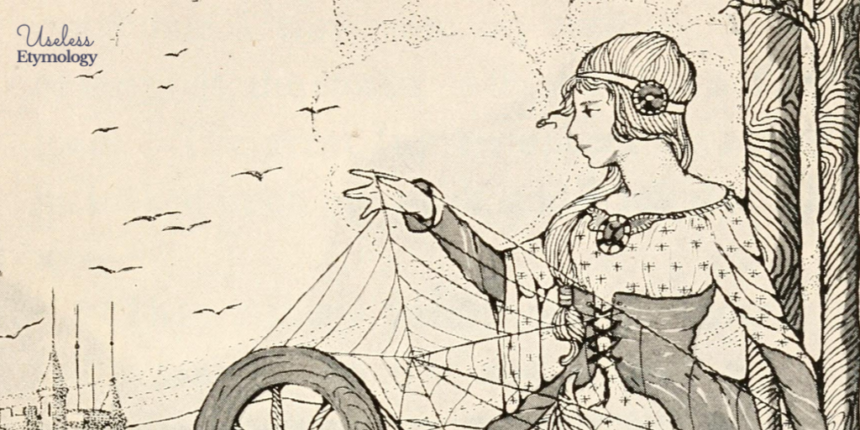Have you ever wondered why unmarried women over a certain age have historically been called spinsters?
Originally a word for a woman who spins thread for a living, “spinster” is structured in the same way as words like “trickster” or “gangster”—it’s the word “spin” with an agent noun ending.
But the latter two words are far more recent constructions than “spinster”—and following a critical change in that ending.
The -ster ending was originally an Old and Middle English suffix that specifically referred to actions and professions of women, corresponding to the masculine ending -er (as in butcher, lawyer, cobbler or chandler).
Old English agent noun endings:
- -istre (feminine)
- -ere (masculine)
Middle English variations:
- -ster (feminine)
- -er (masculine)
The association between “spinster” and women who never marry is based on the tradition that those who are unwed should take up a “women-appropriate” profession such as spinning.
This also appears in other Middle English professions that were women dominated. For instance, in Middle English, a seamstress was called a “sewster,” a “whitester” was a woman who bleaches cloth and “webster” was a woman weaver.
Indeed, the Old and Middle English surnames Webster, Brewster, and Baxter (literally bake-ster) were originally words for professions—and specifically women doing them. And indeed, those trades—weaving, brewing ale, and baking—were often performed by women. Meanwhile, the male counterparts to these professions were Weber, Brewer and Baker, which are also common profession-based names from that era. (The similarity to “sister” is also likely no accident in the sense association with women, though it entered via a different route.)
It is a topic of some debate among linguists about the femininity of the names Webster, Brewster and Baxter because—as is often the case and unsurprisingly given patrilineal naming conventions—there are more records of men with those names and in those professions from that time period than women.
But it would be unusual for a word from that time period to use the ending -ster and not be associated with women: To someone in the 1200s or 1300s, “brewster” would likely be understood to mean a woman who brews ale, much as the word “actress” is understood to mean a woman who acts today.
Speaking of which, the -ster ending became more gender-neutral when it was displaced by the French-derived ending -ess (e.g., actress, seamstress), while the previously masculine ending -er ending became more gender-neutral—though it was already in use as more of the “default” agent noun ending … because patriarchy and such. (However we did get the masculine agent noun ending -or from Latin, which is why the Old English-derived “baker” ends with -er, but the Latin-derived “tailor” ends with -or… and also ended up tacked on to some Old English words, as in “sailor.”)
But back to the ending on “spinster.”
It wasn’t just professions: The mildly pejorative edge in “spinster” also appeared in Middle and early Modern English words for women such as “chidester” and “scoldster,” though at that point its journey to gender neutrality had already begun.
Once the ending was more firmly gender neutral in the 1600s and 1700s, it was tacked onto all sorts of words—like a “rodster” was another word for an angler of any gender, a gamester was a person who gambles, and before it was the name of a car, a “roadster” was a person or a horse who travels frequently.
The reason the -ster ending is used in these words instead of just -er is might be because the ending’s usage in pejorative terms like spinster was misinterpreted as being more casual than a straightforward profession. Implying a habit or hobby or lifestyle rather than a job, and sometimes with a negative edge.
But little do gangsters, jokesters, fraudsters, pranksters and mobsters know that their names would have sounded eminently feminine in earlier forms of English.
Read more in Words from Hell.





